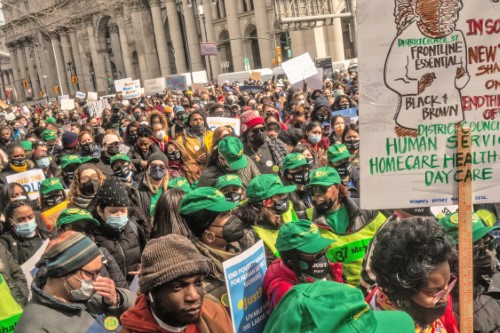Public Employee Press: PEP Talk
Union rallies for Human Services workers’ pay increase

In a compromise between the Governor and the State Legislature, the recently passed New York State budget provides Human Services Workers with a $3-an-hour increase, bringing current wages to $17 an hour this October. By Oct. 2024, there will be an additional $1 per hour raise to $18 an hour, with enforcement given to the New York State Department of Labor.
Also included in the budget is a clarification for the minimum cash portion of the salary and the amount allowed for employee benefits.
More than 1,000 DC 37 leaders and members, activists, and a large contingent of city leaders crowded City Hall Park on March 10.
Under sunny skies and the lifting of many COVID-19 restrictions, the rally called by the #JUSTPAY coalition brought together many in solidarity to speak out on behalf of tens of thousands of Human Services workers in the private sector who struggle with poverty-level wages and short staffing.
These essential workers who work for private and non-profits contracted with New York City and state agencies are exploited, work long hours, and are paid far less than their counterparts in the public sector workforce.
DC 37 represents 17,000+ workers in its non-profit private sector division.
A recently released report from the Center for New York City Affairs uncovered that two-thirds of these workers are paid at or below the city’s poverty level. In addition, more than 66% of Human Services workers are women, and nearly 70% are people of color — communities hardest hit economically by the pandemic.
“It is long past time that these dedicated workers be paid a fair wage for their services for our at-risk communities,” said Executive Director Henry Garrido. “The City and Albany must act now to provide the prevailing wage they deserve.”
Joanna Ortiz, a pediatric community health worker with Public Health Solutions, spoke about the economic inequities she struggles with at home.
“Unfortunately, this is a story of many human service workers who, like me, remain in the field because we love the work we do. There is no better satisfaction than the gratitude families give us every day. However, my colleagues and our families cannot survive off gratitude. A wage to live in the city would be equally satisfying,” Ortiz said.
After the rally, Kanya J. Flowers, a case worker from Little Flower Children and Family Services’ Brooklyn Flagship site and a Local 215 member, described her experiences at her workplace.
“I worked many late nights and overnights even when I was not scheduled to care for and help clients expressing suicidal thoughts, to make sure they knew someone is there for them,” Flowers said. “I cannot afford to live alone in the city because my wages are not enough. I feel like I am forced to live with my family. Because of our low pay, some of my colleagues inquire about roommates to help pay living expenses, and it’s unfortunate, so many of my co-workers have additional full-time jobs to help them survive.”
“I cannot afford to live alone in the city because my wages are not enough. I feel like I am forced to live with my family.”
— Kanya J. Flowers
Local 215 Case Worker
Although the current city budget proposal does not address cost-of-living increases for these workers, City Council members at the rally promised to press for more funding for human services contracts.
On March 18, 200 home care workers represented by DC 37 rallied in front of New York Governor Kathy Hochul’s Manhattan office to demand fair pay be included in the state budget.
Local 389 President Margaret Glover, who has been a Home Health Care Aide for nearly 40 years, told the crowd. “We have been nickeled and dimed for too long. I remember when we would work 90-hour weeks and not clear $500 in take-home pay,” Glover said. “Can you imagine having to negotiate for a nickel or a dime to be added to our minimum wage salaries?”
“Home Health Aides are assigned by the employer to give service to our most vulnerable population: the elderly and children and adolescents. Our work is good. We help people get well and healthy,” Glover said. “But our wages are threshold poverty wages. The proposed Fair Pay for Home Care Workers Act would significantly increase wages now and in the future for Home Care employees. Pass this legislation!”
Ortiz, who holds a master’s degree in Public Health, is a single parent of two daughters, but her family shares an apartment with Ortiz’s father because of her low salary.
“I find it ironic that a human service worker could benefit from the aid I help families obtain. Nonetheless, by city and state standards, I do not qualify despite having a full-time job,” she said. “I am still in the lower-income tier in New York.
DC 37 is also part of a union coalition demanding action on a minimum $22 an hour wage for all city- and state-funded Human Services workers. The coalition also urges automatic annual cost-of-living adjustments on all contracts with these private and non-profit agencies and creates a wage and benefits schedule for government-contracted workers comparable to the salaries of city and state public workers. The union also petitioned to demand an end to the exploitative income disparities and give these essential workers a livable wage a and benefits.
The #JUSTPAY coalition continues its fight for a living wage in supporting a bill introduced on June 2 by Council Member Althea Stevens that establishes a prevailing wage and a benefits schedule for the thousands of human services workers in New York City. The coalition also demands that Mayor Adams include a 5.4% COLA in the New York City budget.


